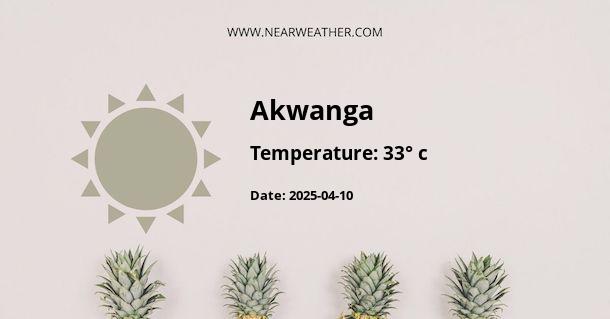Akwanga, Nigeria: Climate and Weather Year Round
Akwanga is a town located in the Akwanga Local Government Area of Nasarawa State, Nigeria. It is situated in the central part of the country and has a diverse climate that experiences variations throughout the year. In this article, we will explore the climate and weather patterns in Akwanga, providing detailed information about the temperature, precipitation, and other relevant factors that influence the local weather conditions.
Geographical Location
Akwanga is located at a latitude of 8.9100° N and a longitude of 8.4000° E. It is situated at an elevation of approximately 586 meters (1,923 feet) above sea level. The town is surrounded by hills and is in close proximity to the Benue River, which influences the local climate.
Climate Classification
Akwanga falls under the tropical savanna climate classification (Aw) according to the Köppen-Geiger climate classification system. This means that the town experiences distinct wet and dry seasons throughout the year.
Temperature
The average annual temperature in Akwanga is around 26°C (78.8°F). The hottest months are typically March and April, with average temperatures ranging from 29°C to 32°C (84.2°F to 89.6°F). The coolest months are December and January, with average temperatures ranging from 23°C to 25°C (73.4°F to 77°F).
Throughout the year, Akwanga experiences relatively high temperatures, with minimal variations between seasons. This is characteristic of a tropical climate, where temperatures remain warm throughout the year.
Humidity
Akwanga experiences high humidity levels due to its proximity to the Benue River and its surrounding vegetation. The relative humidity in the town typically ranges from 60% to 90%. The highest humidity levels are often observed during the rainy season.
Rainfall
Akwanga has a distinct wet and dry season. The rainy season typically starts in April and lasts until October, with the peak of rainfall occurring between June and September. During this period, the town receives an average of 1,200 to 1,500 millimeters (47.2 to 59.1 inches) of rainfall.
The dry season in Akwanga lasts from November to March, with significantly reduced rainfall. The town receives an average of 10 to 50 millimeters (0.4 to 2 inches) of rainfall during this period. The driest months are typically January and February.
Wind Patterns
Akwanga experiences prevailing winds from the northeast during the dry season, influenced by the Harmattan wind from the Sahara Desert. These winds often bring dry and dusty conditions to the area. During the rainy season, the wind patterns shift, and the town experiences winds from the southwest.
Climate Variability and Impacts
Climate variability in Akwanga can have significant impacts on the local population and economy. The wet season provides favorable conditions for agriculture, with farmers growing crops such as maize, yam, millet, and sorghum. However, excessive rainfall can lead to flooding, which can damage crops and infrastructure.
The dry season, characterized by the Harmattan wind, can have negative effects on human health, particularly for individuals with respiratory conditions. The dry and dusty conditions can also impact visibility and transportation.
Conclusion
Akwanga, Nigeria, experiences a tropical savanna climate with distinct wet and dry seasons. The town has relatively high temperatures year-round, with minimal variations between seasons. The wet season, which lasts from April to October, brings significant rainfall, while the dry season, from November to March, is characterized by reduced rainfall and the influence of the Harmattan wind. Understanding the climate and weather patterns in Akwanga is crucial for agricultural activities, infrastructure planning, and the well-being of the local population.
A - Akwanga's Latitude is 8.916670 & Longitude is 8.383330.
A - Weather in Akwanga is 33° today.
A - Climate Conditions in Akwanga shows overcast clouds today.
A - Humidity in Akwanga is 44% today.
A - Wind speed in Akwanga is 7.2 km/h, flowing at 188° wind direction. today.
